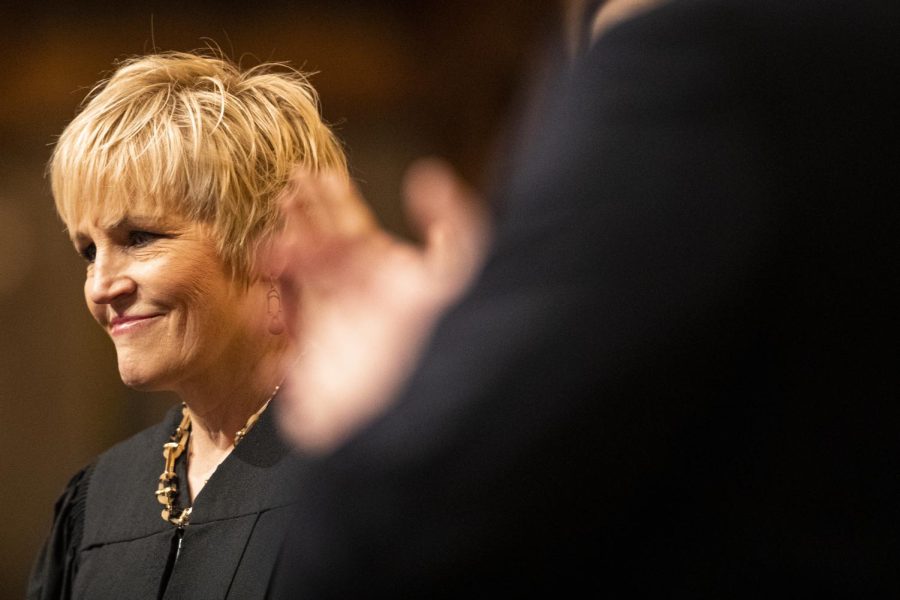Iowa Chief Justice Susan Christensen looks to include Iowans in judicial reform
In 2022, Iowa Supreme Court Chief Justice Susan Christensen went around the state to find out what issues face district courts and lawyers. In her third State of the Judiciary address, she spoke on the shortage of court reporters, and contract attorneys, and the problems facing the juvenile justice system.
Iowa Supreme Court Chief Justice Susan Christensen smiles during the 2023 State of the Judiciary at the Iowa State Capitol in Des Moines on Wednesday, Jan. 11, 2023. In Christensen’s speech, she addressed moving some in-person trials to over remote formats. “If covid has taught us anything, it is that we can and we should be using remote technology more than we have in the past to conduct routine uncontested matters,” Christensen said.
January 11, 2023
Iowa Supreme Court Chief Justice Susan Christensen highlighted the shortage of court reporters and contract attorneys as the main problems the Iowa Judicial Branch is facing during her third State of the Judiciary address to a joint session of the Iowa Legislature on Wednesday morning.
Christensen also emphasized including Iowans’ voices in judicial branch reform discussions.
“As we mature, those reminders to listen dwindle but the importance of listening never leaves us in the legal profession. It’s been said that justice cannot exist without listening,” Christensen said. “That makes perfect sense. How can we provide litigants an opportunity to be heard if we are not listening to what is being said.”
In 2022, Christensen visited district courts across the state to listen to the problems at hand and hear from Iowans.
“One of the best ways for me to learn what’s going on across the state is to reach out to lawyers and judges from all the different districts,” Christensen said.
Christensen said the shortage of court reports and contract attorneys is not just hurting the court system but those who are intertwined in the justice system such as defendants, lawyers, and judges affecting timely trials. Without court reporters, who transcribe every word said during a hearing, cases are pushed leaving defendants without a judgment.
According to The Gazette, Iowa currently has 33 job openings for court reporters and Iowa Workforce Development projects court reporter job openings to rise annually until 2028.
“The Iowa supreme court is listening, we know how the court reporter shortage crisis affects every legal proceeding and we are committed to making it better,” Christensen said.
The Iowa judicial system is also experiencing shortages in contract attorneys, private lawyers who sign a contract with the state public defender’s office. Christensen said the contract attorney shortage is slowing down the occurrence of criminal proceedings.
“While the court reporter crisis is having a profound impact on our ability to move cases along and to consistently provide certified records,” Christensen said. “The statewide kind contract attorney shortage is threatening to bring criminal proceedings to a screeching halt.”
Christensen said she has seen the shortage affect juvenile court proceedings the most. Fewer attorneys result in delayed hearings, which affect issues like the placement of a child into state-facilitated rehab programs, juvenile detention, or the child welfare system.
To solve this shortage, Christensen is recommending an increase in contract attorneys’ hourly rate, and travel reimbursement and promises the Iowa Supreme Court will continue to listen to lawyers.
During her speech last year, Christensen mentioned the Juvenile Justice Task Force, which was created in December 2021. The force was charged to review the inner workings of Iowa’s juvenile justice system and to make recommendations to improve the system.
The task force, which consists of members of Iowa’s judicial branch, the Department of Health and Human Services, and the Department of Human Rights, has given 60 recommendations so far that will be available to the public at the end of January.
“We hope you, our legislators and policymakers, will listen to the many voices that comprise that task force and consider the implementation of the recommendations,” Christensen said.
The recommendations range from making sure children who have been removed from their homes are attending school and addressing the gender disparities in the juvenile delinquent system.
Looking to next year, Christensen said she and the rest of the Iowa Supreme Court will continue to listen to stakeholders across the state.
“I want to do this in an effort to improve the judicial branch,” Christensen said. “And its steadfast commitment to ensuring that each and every Iowan has meaningful access to justice.”



